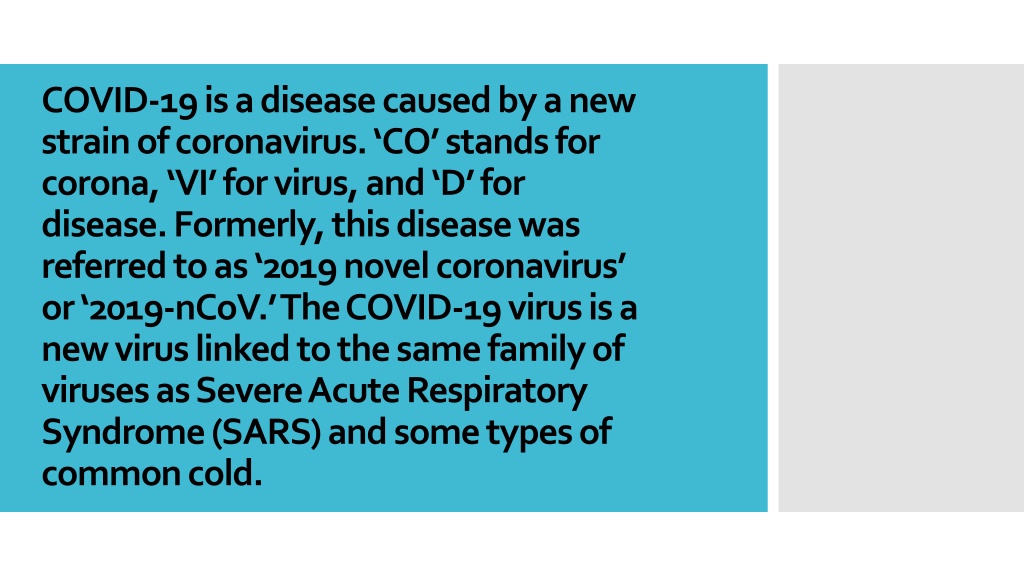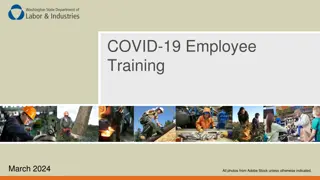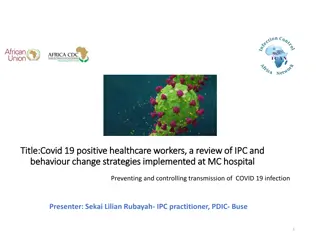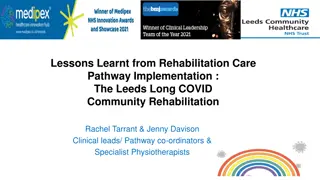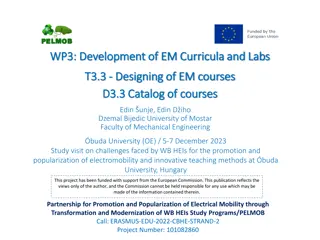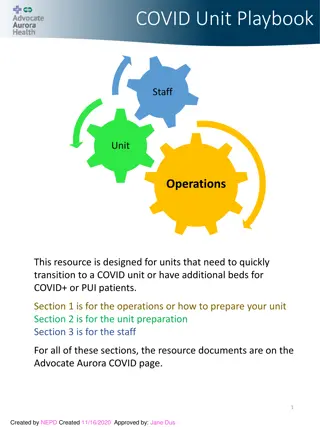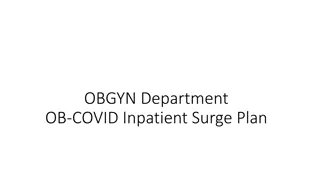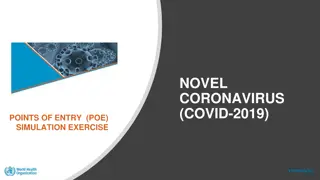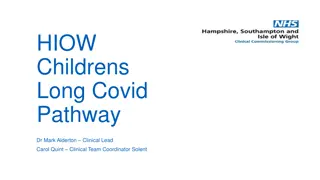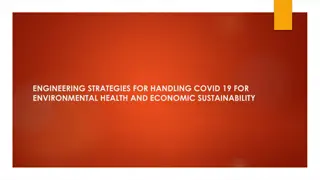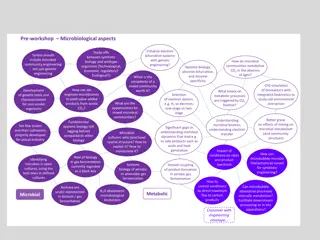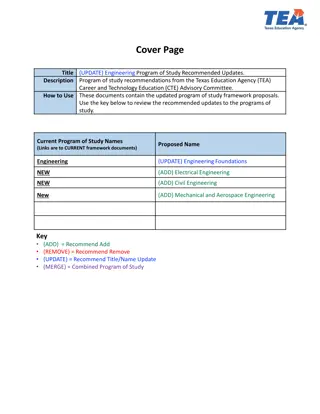COVID-19 and Engineering Strategies
COVID-19 is caused by a new strain of coronavirus. Learn about the impact on global industries, health measures, and innovative engineering solutions combating the pandemic.
Download Presentation

Please find below an Image/Link to download the presentation.
The content on the website is provided AS IS for your information and personal use only. It may not be sold, licensed, or shared on other websites without obtaining consent from the author. Download presentation by click this link. If you encounter any issues during the download, it is possible that the publisher has removed the file from their server.
E N D
Presentation Transcript
COVID-19isa diseasecaused by a new strain of coronavirus. CO stands for corona, VI for virus, and D for disease. Formerly, this disease was referred to as 2019 novel coronavirus or 2019-nCoV. The COVID-19 virus is a new virus linked to the same family of viruses as Severe Acute Respiratory Syndrome (SARS) and some types of common cold.
ENGINEERING STRATEGIES FOR HANDLING COVID-19 FOR ENVIRONMENTAL HEALTH AND ECONOMIC SUSTAINABILITY
STRATEGIES TO CURB THE SPREAD OF COVID-19 Performing hand hygiene frequently with an alcohol- based hand rub if your hands are not visibly dirty or with soap and water if hands are dirty; Avoiding touching your eyes, nose and mouth; Practicing respiratory hygiene by coughing or sneezing into a bent elbow or tissue and then immediately disposing of the tissue; Wearing a medical mask if you have respiratory symptoms and performing hand hygiene after disposing of the mask; Maintaining social distance (a minimum of 1 m) from individuals with respiratory symptoms. The COVID-19 pandemic has hit the business world in an unprecedented scale and speed. It has caused the closures of business, the stoppage of factory outputs, and the disruption to global manufacturing industries and their supply networks.
DEVELOPMENT OF ENVIRONMENTAL HEALTH ENGINEERING FACILITIES, EQUIPMENT, SENSORS AND PUBLIC HEALTH SYSTEMS FOR TACKLING COVID-19 PANDEMIC
An online COVID-19 Triage Tool, which allows users to self-asses their coronavirus risk category, has been designed by a company in Nigeria. South Africa's government is using WhatsApp to run an interactive chat service about coronavirus. China are using robots to disinfect hospitals and deliver medical supplies. In South Korea, authorities are tracking potential carriers using cell phone satellite technology.
ASSESSMENT OF OCCUPATIONAL HAZARDS AND DEVELOPMENT OF ENGINEERING EQUIPMENT TO SUPPORT HEALTH WORKERS AGAINST COVID-19
For all workers, regardless of specific exposure risks, it is always a good practice to: Frequently wash your hands with soap and water for at least 20 seconds. When soap and running water are unavailable, use an alcohol-based hand rub with at least 60% alcohol. Always wash hands that are visibly soiled. Avoid touching your eyes, nose, or mouth with unwashed hands. Avoid close contact with people who are sick. ENGINEERING EQUIPMENT DESIGNEDTO SUPPORT HEALTH WORKERS General Medical Equipment like; You will need bandages, gloves, stethoscopes, blood pressure monitors, otoscopes, tongue depressants, antibacterial wipes, syringes, and ointments.
DESIGN OF INNOVATIVE AND AUTOMATED RESPIRATORY BUILDINGS FOR PATIENTS AND HEALTH WORKERS AGAINST CORONAVIRUS DISEASE OUTBREAK
Protect your workforce: Screen patients and visitors for symptoms of acute respiratory illness (e.g., fever, cough, difficulty breathing) before entering your healthcare facility. Ensure proper use of personal protection equipment (PPE); Healthcare personnel who come in close contact with confirmed or possible patients with COVID-19 should wearthe appropriate personal protective equipment. Conduct an inventory of available PPE;Consider conducting an inventory of available PPE supplies. Encourage sick employees to stay home; Personnel who develop respiratory symptoms (e.g., cough, shortness of breath) should be instructed not to report to work. Ensure that your sick leave policies are flexible and consistent with public health guidance and that employees are aware of these policies.
Protect your patients: Separate patients with respiratory symptoms so they are not waiting among other patients seeking care.Identify a separate, well-ventilated space that allows waiting patients and visitors to be separated. Consider the strategies to prevent patients who can be cared for at home from coming to your facility potentially exposing themselves or others to germs, like: Using your telephone system to deliver messages to incoming callers about when to seek medical care at your facility, when to seek emergency care, and where to go for information about caring for a person with COVID at home. Adjusting your hours of operation to include telephone triage and follow-up of patients during a community outbreak. Leveraging telemedicine technologies and self-assessment tools.
ENGINEERING LAW AND MANAGERIAL ECONOMICS FOR INFRASTRUCTURAL DEVELOPMENT IN NIGERIA: CHALLENGES AND WAY FORWARD
CHALLENGES INCLUDE; We can identify poor funding, inadequate equipment, students' population explosion (without commensurate facilities), lack of high-quality manpower (in terms of trainers or teachers), inadequate industrial training and poor attitude of employers as the dominant problems faced by engineering education in Nigeria
RECOMMENDATIONS; Adequate Funding and Greater Private Sector Involvement. Greater Transparency and Good Governance Population Control The Need for Physical Planning
OPERATION, MAINTENANCE AND MANAGEMENT OF ENGINEERING EQUIPMENT FOR SUSTAINABLE DEVELOPMENT IN NIGERIA
Maintenance is an activity that can be applied to all systems, both natural and man- made, to cause such systems to remain unaltered or unimpaired. An efficient maintenance system ensures that the productive and operational life of a facility is as long as possible with cost of maintenance of the infrastructure at the lowest possible. Causes of the abysmal maintenance culture in Nigeria Maintenance not being treated seriously at the board level or even by local management; lack of business culture in the maintenance process; Lack of adequate management skills by maintenance technicians and even team leaders; Isolation of the maintenance operation with little or no integration with the activities of other departments; Absence of adequate planned preventive maintenance methods; Pre-occupation with introduction of advanced maintenance methods while relevant basic maintenance practices are not being implemented.
ENGINEERING LAW AND HAZARDASSESSMENT OF HEALTH WORKERS FOR ENHANCED OCCUPATIONAL SAFETY IN NIGERIA
Majority of health workers in this study(COVID-19) are moderately prone to high risk of occupational hazards which further confirmed that Health care workers are exposed to a very wide variety of risks and that they operate in an environment that is considered to be one of the most hazardous occupational ventures.
CRITICAL ASSESSMENT OF LEGAL IMPLICATIONS AND ECONOMIC IMPACT OF LOCK DOWN OF ACTIVITIES IN NIGERIA
THE IMPLICATION OF COVID-19 ON THE ECONOMY It has caused many companies to relieve some staffs of their duties as there are excess people confined to smaller resources. Education at the nursery and primary levels have been stopped leaving so many teachers stranded Production of food and liverstock are done at a smaller quantity and rate.
DEVELOPMENT OF AUTOMATED MACHINE AND ELECTRO- MECHANICAL DEVICES FOR PRODUCTION OFINFECTION PREVENTION AND CONTROL (IPC) ANDPERSONAL PROTECTIVE EQUIPMENT (PPE) FOR PUBLIC HEALTH AND ECONOMIC GROWTH IN NIGERIA
Rational use of personal protective equipment for COVID-19 Deployment of IPC specialists to support the COVID-19 response and to facilitate IPC training Development of Frequently Asked Questions (FAQ) in response to queries from the public and communities on blood safety, PPE for specimen collection, cleaning & disinfection, self-isolation and self- monitoring.
